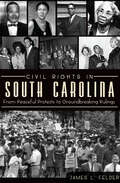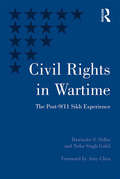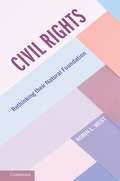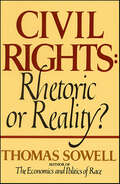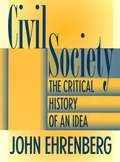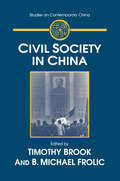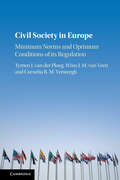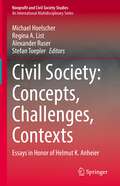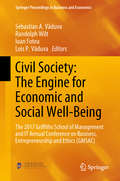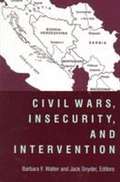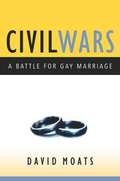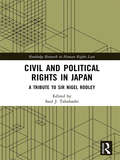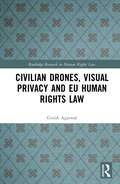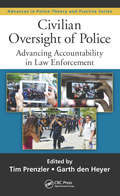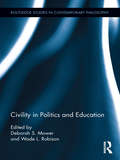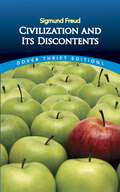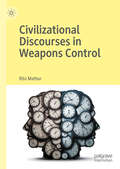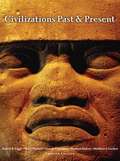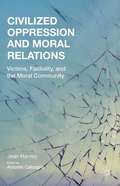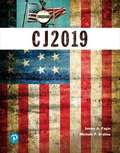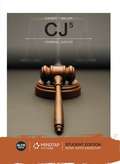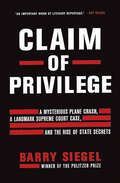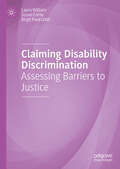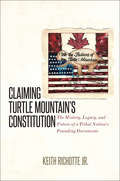- Table View
- List View
Civil Rights in South Carolina: From Peaceful Protests to Groundbreaking Rulings (American Heritage Ser.)
by James L. FelderThe civil rights movement in South Carolina has an epic and tumultuous history, beginning with the very first statewide meeting of the NAACP in 1939.With stories of sit-ins, movements and the integration of state universities, this is the first comprehensive history of South Carolina's civil rights struggles. And behind every achievement are the major legal rulings that protected them, interspersed with the familiar names of Thurgood Marshall, Matthew Perry, Ernest A. Finney and Judge Waties Waring. Join former South Carolina NAACP president and activist James L. Felder as he recounts the epic struggle African Americans have faced, from fighting for the right to vote to the desegregation of public spaces and all the efforts in between.
Civil Rights in Wartime: The Post-9/11 Sikh Experience
by Dawinder S. Sidhu Neha Singh GohilIn the days, months, and now years following the events of September 11th, 2001, discrimination against the Sikh community in America has escalated sharply, due in part to a populace that often confuses Sikhs, compelled by their faith to wear turbans, with the Muslim extremists responsible for the devastating terrorist attacks. Although Sikhs have since mobilized to spread awareness and condemn violence against themselves and Muslims, there has been a conspicuous absence of academic literature to aid scholars and commentators in understanding the effect of the backlash on the Sikh community. This volume provides a unique window onto this particular minority group's experience in an increasingly hostile climate, and offers a sharp analysis of the legal battles fought by Sikhs in post-9/11 America. In doing so, it adds a new chapter to the ongoing national story of the difficulties minority groups have faced in protecting their civil liberties in times of war.
Civil Rights: Rethinking their Natural Foundation (Cambridge Studies on Civil Rights and Civil Liberties)
by Robin L. WestAll of us are entitled to the protections of law against violence, to a high quality education, to decent employment that respects our dignity, and to necessary assistance with our caregiving. Our civil rights are our rights to the protections of ordinary law - not constitutional law, and not only antidiscrimination law - that will ensure that we can participate in civil society, and hence lead flourishing lives. In this innovative work, Robin L. West looks back to nineteenth-century Civil Rights Acts to argue that the point of civil rights law is not only non-discrimination, but also to assure that all of us receive the protection of legal rights that promote human flourishing. Since the 1960s, Supreme Court decisions on civil rights issues have focused on non-discrimination and thus have 'hollowed out' this broader meaning of civil rights law. This book reconceives civil rights as a set of legal guarantees that all will be included in the legal, political, economic and social projects central to civil society.
Civil Rights: Rhetoric or Reality
by Thomas SowellIt is now more than three decades since the historic Supreme Court decision on desegregation, Brown v. Board of Education. Thomas Sowell takes a tough, factual look at what has actually happened over these decades -- as distinguished from the hopes with which they began or the rhetoric with which they continue, Who has gained and who has lost? Which of the assumptions behind the civil rights revolution have stood the test of time and which have proven to be mistaken or even catastrophic to those who were supposed to be helped?
Civil Society
by John R. EhrenbergIn the absence of noble public goals, admired leaders, and compelling issues, many warn of a dangerous erosion of civil society. Are they right? What are the roots and implications of their insistent alarm? How can public life be enriched in a period marked by fraying communities, widespread apathy, and unprecedented levels of contempt for politics? How should we be thinking about civil society? Civil Society examines the historical, political, and theoretical evolution of how civil society has been understood for the past two and a half millennia. From Aristotle and the Enlightenment philosophers to Colin Powell's Volunteers for America, Ehrenberg provides an indispensable analysis of the possibilities-and limits-of what this increasingly important idea can offer to contemporary political affairs. Civil Society is the winner of the Michael J. Harrington Award from the Caucus for a New Political Science of APSA for the best book published during 1999.
Civil Society in China: Civil Society In China (Studies On Contemporary China)
by Timothy Brook B. Michael FrolicThe concept of civil society was borrowed from 18th-century Europe to provide a framework for understanding the transition to post-authoritarian regimes in Latin America and post-communist regimes elsewhere. This book asks whether this concept is useful for analyzing China.
Civil Society in Europe: Minimum Norms and Optimum Conditions of its Regulation
by Van Der Ploeg Tymen J. Van Veen Wino J. M. Versteegh Cornelia R. M.The regulation of civil society provides the framework under which those organisations can most effectively provide services in education, health, social services, housing, development aid and so on. Civil Society in Europe identifies common principles of civil society law in two ways. First, the approaches of the Council of Europe and the European Union are explored. Next civil society regulation in twelve domestic legal systems are investigated on a broad range of substantive areas of law including internal organisation, registration, external supervision, public benefit organisations and international activities. From these, the authors distill a set of minimum norms and optimal conditions under which civil society can deliver its aims most effectively. This book is essential reading for policymakers and legislators across Europe and beyond.
Civil Society: Essays in Honor of Helmut K. Anheier (Nonprofit and Civil Society Studies)
by Michael Hoelscher Alexander Ruser Regina A. List Stefan ToeplerThis volume is a collection of original essays prepared by colleagues, collaborators, and former students on the occasion of Helmut K. Anheier’s 65th birthday and retirement from the University of Heidelberg. An internationally recognized pioneer of nonprofit and civil society studies, Anheier focused his work on providing clarity around (1) civil society, local and global, observing its origins and trajectory and developing theories to explain it; (2) the nonprofit sector and institutions within and extending from it, including nonprofit organizations, philanthropy and social investment; and (3) culture as it relates to democracy and back to civil society. The essays in this volume refer to these concepts and position them in the context of developments over the last two to three decades. The volume is arranged in three sections. The first section comprises essays that elucidate concepts and probe theories in the field. The second section presents chapters discussing current global challenges and trends in the focal areas. The third and final section then comprises country and regional case studies illustrating important aspects of the global challenges or theoretical issues of the two preceding sections.A fascinating and up-to-date overview of key issues and trends in civil society and nonprofit research by an international collection of eminent scholars in these fields, this book will be attractive to civil society and nonprofit sector researchers as well as a broader academic community of political scientists, sociologists, economists, and cultural experts.
Civil Society: The 2017 Griffiths School of Management and IT Annual Conference on Business, Entrepreneurship and Ethics (GMSAC) (Springer Proceedings in Business and Economics)
by Sebastian A. Văduva Randolph Wilt Ioan Fotea Lois P. VăduvaThis proceedings volume explores the concept of civil society as an engine for economic and social well-being. Featuring contributions from the 2017 Griffiths School of Management and IT Annual Conference on Business, Entrepreneurship and Ethics (GMSAC) held in Oradea, Romania, this volume provides different perspectives, emerging studies and trends that are crucial to the further understanding of the interconnection of civil society, economic development and social stability. The enclosed contributions address key topics such as a) the ways in which national, regional and local governments are best equipped to support economic and social development, b) how government, business and non-profit sectors can support economic and social stability and c) the ways in which growing economies’ active societies can strengthen civil society. Research and practice have proven that there is a great potential for civil society organizations to support socio-economic well-being, both directly and indirectly. As a result, the interplay between civil society, economics and social well-being is highly relevant to current business and economic research and is a topic of discussion by academics and practitioners in the government, business and non-profit sectors. This volume showcases some of the current research, cases and discussions in this area from an interdisciplinary, global perspective. Featuring contributions exploring timely subjects such as consumer behavior, the hospitality industry, education, corporate social responsibility (CSR), banking, health care, and semiotics, this book is appropriate for researchers, academics and policy makers in economic and social development, business ethics and sustainability.
Civil Wars, Insecurity, and Intervention
by Jack Snyder Barbara F. WalterSince the end of the cold war, a series of costly civil wars, many of them ethnic conflicts, have dominated the international security agenda. The international community, often acting through the United Nations or regional organizations like NATO, has felt compelled to intervene with military forces in many of these conflicts -- four of which comprise the heart of this book: Bosnia and Herzegovina, Somalia, Cambodia, and Rwanda. Civil Wars, Insecurity, and Interventionis a detailed examination by a host of distinguished scholars of these recent interventions in order to draw lessons for today's policy debates. The contributors view ethnic conflict and internal war through the prism of the concept of the security dilemma -- a situation in which parties with strong incentives to cooperate wind up nonetheless in bloody competition out of distrust of the opponent. Civil Wars, Insecurity, and Interventionassesses how international intervention can help solve the security dilemma in civil wars by designing political and military arrangements that make security commitments credible to the warring parties. The mixed record of partial successes, failures, and in some cases counterproductive interventions suggests an urgent need to extract lessons with a view toward developing a framework for making future policy choices.
Civil Wars: A Battle for Gay marriage
by David MoatsStory of battle over same-sex marriage in Vermont written by Pulitzer Prize-winning journalist who covered the story.
Civil and Political Rights in Japan: A Tribute to Sir Nigel Rodley (Routledge Research in Human Rights Law)
by Saul J. TakahashiThe human rights issues in Japan are multifaceted. Over decades, domestic and international human rights organisations have raised concerns, but government obstinacy has meant there has been little progress. Recommendations of UN human rights bodies are routinely ignored, and statements by the government in the Japanese parliament regarding these recommendations have been dismissive. At the review of Japan’s implementation of the International Covenant on Civil and Political Rights in 2014, Professor Nigel Rodley, then chair of the UN Human Rights Committee, lamented the lack of true engagement by Japan and the country’s unwillingness to take any action on the conclusions of UN human rights bodies. Equally worrying is the clear trend over recent years of popular publications bashing neighbouring countries and their nationals living in Japan as well as UN human rights bodies. This book explores the issues surrounding human rights in Japan, and what the future might hold for the country.
Civilian Drones, Visual Privacy and EU Human Rights Law (Routledge Research in Human Rights Law)
by Girish AgarwalThis book examines rights issues in relation to visual privacy in the use of civilian drones. Here, visual privacy is described as the freedom from a combination of unwanted activities directed towards an individual, such as observing, recording, and publishing of personal visual information without an individual’s consent. The book answers the question of whether visual observation of an individual with the help of the camera systems onboard a civilian drone is lawful in light of EU law. It also discusses the legality of the subsequent recordings and publications. The issues are considered in terms of the European Convention of Human Rights, the Charter of Fundamental Rights of the European Union, the case law of the European Court of Human Rights and the Court of Justice of the European Union and EU General Data Protection Regulation. The book will be a valuable resource for researchers, academics and policy-makers working in the areas of technology, privacy and human rights law.
Civilian Oversight of Police: Advancing Accountability in Law Enforcement (Advances in Police Theory and Practice)
by Tim Prenzler Garth Den HeyerExploring the complex and controversial topic of civilian oversight of police, this book analyzes the issues and debates entailed by civilian oversight by using worldwide perspectives, in-depth case studies, and a wealth of survey data. It integrates and summarizes decades of research from many locations around the globe to present a best practices model for managing police conduct. It also describes the impact of oversight agencies on police policy, including innovative means by which agencies can work with police departments to improve police conduct.
Civility in Politics and Education (Routledge Studies in Contemporary Philosophy)
by Wade L. Robison Deborah S. MowerThis book examines the concept of civility and the conditions of civil disagreement in politics and education. Although many assume that civility is merely polite behavior, it functions to aid rational discourse. Building on this basic assumption, the book offers multiple accounts of civility and its contribution to citizenship, deliberative democracy, and education from Eastern and Western as well as classic and modern perspectives. Given that civility is essential to all aspects of public life, it is important to address how civility may be taught. While much of the book is theoretical, contributors also apply theory to practice, offering concrete methods for teaching civility at the high school and collegiate levels.
Civilization and Its Discontents
by Sigmund Freud Joan RiviereThe struggle between the urgencies of instinct and the restrictions of civilization is addressed throughout the works of Sigmund Freud, and in Civilization and Its Discontents the theme is developed with particular richness and depth. This famous study explores the guilt that arises when personal desires clash with social norms, and it examines attempts to reconcile the conflict.In a sense, such guilt is among civilization's building blocks, keeping aggressive and selfish instincts within bounds. But it can also be a source of great frustration, and Freud examines at length many ways of dealing with guilt, from artistic and scientific pursuits to abuse of drink and drugs. The great psychologist offers revealing insights into the motivation behind human behavior as well as the evolution of many social institutions. This seminal study reveals the struggles to resolve conflicts and cast off guilt as spurs to the growth of civilization and culture.
Civilizational Discourses in Weapons Control
by Ritu MathurThis book seeks to decolonize practices of arms control and disarmament. In this endeavor it seeks to problematize our understanding of time and civilization as rhetorical resources. The need for such an undertaking can be premised on the claim that while problems of modernity, ethnocentrism and universalism are now a central concern within the field of international relations, these ideas are scarcely debated or contested within the field of arms control and disarmament. The singular focus on technological innovations and specific policy-oriented agreements in practices of arms control and disarmament appears to stymie the need for such engagements. This book is an invitation to explore intersecting discourses on colonialism, racialism, nationalism and humanitarianism within a historically grounded terrain of weapons control. An understanding of these practices is vital not to prescribe any standards of civilization or exceptionalism in weapons control but to be cognizant through critique of the dangers embedded in any effort at reconstellating the constitutional nuclear order.
Civilizations Past & Present, Combined Volume, Twelfth-Edition
by Barbara Molony Neil J. Hackett George F. Jewsbury Robert R. Edgar Matthew S. GordonThe twelfth edition of Civilizations Past & Present continues to present a survey of world history, treating the development and growth of civilization as a global phenomenon involving the interaction of all of the world's cultures. This new edition, like its predecessors, includes all the elements of history--social, economic, political, military, religious, aesthetic, legal, and technological--to illustrate this global interaction.
Civilized Oppression and Moral Relations
by Jean HarveyThere are significant differences between civilized oppression and violent oppression and these differences show not only in the phenomena involved, but also in the nature of those who actively contribute to the two phenomena ('contributing agents'). Fair characterizations of the agents of civilized oppression often require very different descriptions from those applying to violent oppressors. Many of the failings behind civilized oppression are shared by both the contributing agents and alarge number of the victims. Often it is the privileged social position of the agents that allows those failings to have such a serious impact, whereas the same failings in the victims may be fairly innocuous (though they are not always). This book is alert to this and other differences between civilized and violent oppression. Jean Harvey examines what the moral relations should be between the key players in civilized oppression: the agents, victims, and 'bystanders'.
Cj
by Roger Leroy Miller Larry K. GainesDesigned for, and in partnership with, today's learners, CJ3 was developed to offer a shorter, more affordable book--a book that users will actually WANT to read. The concise, magazine-style format includes all of the key concepts that readers need to learn and a full suite of learning tools to accommodate busy lifestyles--including videos, games, chapter-by-chapter study cards, self-quizzes, downloadable flashcards, and more.
Cj 2019
by James Fagin Michele BratinaCJ 2019 engages students with real criminal justice issues using interactive components and eye-catching visuals. Students explore a repertoire of current events and the resulting challenges faced by practitioners in the subfields of law enforcement, correctional management and administration, and the US court system. Along the way, learners critically consider the cross-systems nature of crime, law, and justice as well as the benefits of integrative approaches to problem-solving. Building on CJ 2010, this 2019 edition adds current events, victimization theories, and significant new content representing changes to the field of criminal justice in 2017 and 2018. CJ 2019, 1st Edition, is also available via Revel(TM) , an interactive learning environment that enables students to read, practice, and study in one continuous experience.
Cj5
by Larry Gaines Roger MillerLearn Criminal Justice YOUR Way with CJ! CJ's easy-reference, paperback textbook presents course content through visually-engaging chapters as well as Chapter Review Cards that consolidate the best review material into a ready-made study tool. With the textbook or on its own, CJ with MindTap allows you to learn on your terms. Read or listen to textbooks and study with the aid of instructor notifications, flashcards and practice quizzes. Track your scores and stay motivated toward your goals. Whether you have more work to do or are ahead of the curve, you'll know where you need to focus your efforts. And the MindTap Green Dot will charge your confidence along the way. When it's time to study, everything you've flagged or noted can be gathered into a guide you can organize.
Claim of Privilege: A Mysterious Plane Crash, a Landmark Supreme Court Case, and the Rise of State Secrets
by Barry SiegelOn October 6, 1948, a U.S. Air Force B-29 Superfortress crashed soon after takeoff, killing three civilian engineers and six crew members. In June 1949, the engineers' widows filed suit against the government, determined to find out what exactly had happened to their husbands and why the three civilians had been on board the airplane in the first place. But it was the dawn of the Cold War and the Air Force refused to hand over any documents, claiming they contained classified information. The legal battle ultimately reached the Supreme Court, which in 1953 handed down a landmark decision that would, in later years, enable the government to conceal gross negligence and misconduct, block troublesome litigation, and detain criminal suspects without due-process protections.Claim of Privilege is a mesmerizing true account of a shameful incident and its lasting impact on our nation—the gripping story of a courageous fight to right a past wrong and a powerful indictment of governmental abuse in the name of national security.
Claiming Disability Discrimination: Assessing Barriers to Justice
by Susan Corby Laura William Birgit PauksztatResearch shows that when accessing and retaining work, and when seeking promotion, disabled people often face discrimination and disadvantage that can be unlawful. Obtaining a remedy is no easy matter as, although access to justice and a fair public hearing are key human rights, disabled claimants often face barriers in Employment Tribunals. Using a unique and bespoke dataset, this book examines the factors that determine the outcome of these cases in British Employment Tribunals. These factors include the impact of case and claimant characteristics, the effect of public sector employment, what happens to disability discrimination claims when they contain claims for other types of discrimination such as race discrimination, and the distinctiveness of a claim for a failure to make a reasonable adjustment. The book concludes by proposing reforms to the legal system, government policy and wider social change, along with suggestions for future research. It will be of great interest to scholars and students of disability discrimination, as well as the broader fields of employment relations, EDI, HRM and labour studies.
Claiming Turtle Mountain's Constitution: The History, Legacy, and Future of a Tribal Nation's Founding Documents
by Keith RichotteIn an auditorium in Belcourt, North Dakota, on a chilly October day in 1932, Robert Bruce and his fellow tribal citizens held the political fate of the Turtle Mountain Band of Chippewa Indians in their hands. Bruce, and the others, had been asked to adopt a tribal constitution, but he was unhappy with the document, as it limited tribal governmental authority. However, white authorities told the tribal nation that the proposed constitution was a necessary step in bringing a lawsuit against the federal government over a long-standing land dispute. Bruce's choice, and the choice of his fellow citizens, has shaped tribal governance on the reservation ever since that fateful day.In this book, Keith Richotte Jr. offers a critical examination of one tribal nation's decision to adopt a constitution. By asking why the citizens of Turtle Mountain voted to adopt the document despite perceived flaws, he confronts assumptions about how tribal constitutions came to be, reexamines the status of tribal governments in the present, and offers a fresh set of questions as we look to the future of governance in Native America and beyond.
